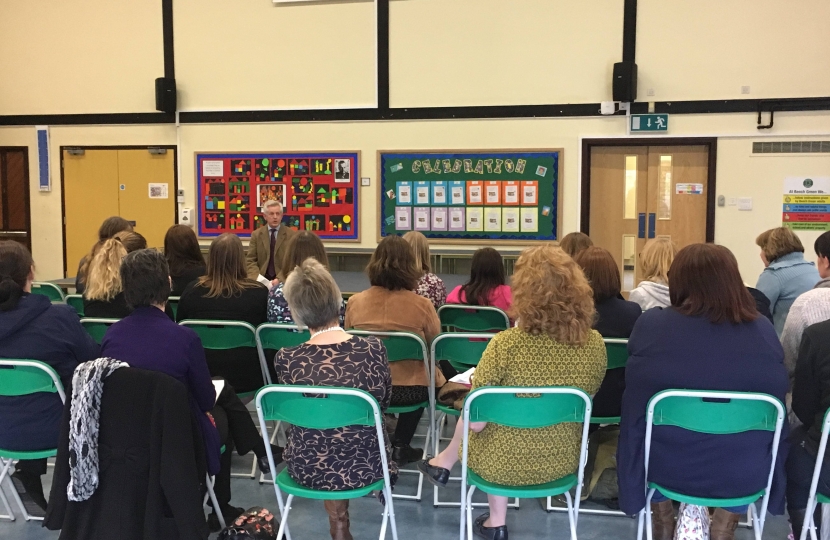
The Government’s consultation on proposals for a new funding formula closes this Wednesday. This is both very important and very complicated – and whatever final proposal emerges it will be impossible to please everyone.
Let me try and explain the issue, the current proposal and where I think we go from here. Please do try and have your say included too.
The problem with our school funding is that no-one can easily explain it and it ends up with huge disparities in the amounts of funding for similar pupils in different parts of the country.
Basically this benefits metropolitan boroughs and cities, at the expense of poorer cities in well off counties, which is roughly our situation. This is unnecessarily complicated and certainly isn’t fair for much of the country. So the government made a pledge to resolve this with a simple new national formula which would explain clearly on what basis each school gets funded.
This required a basic level of funding for each child and then agreed factors, and weightings of those factors, for issues that influence children’s attainment at school to determine extra funding.
The government has proposed such a formula, and the main factors are low prior attainment, deprivation, mobility and English as a second language: alongside school and geographical cost factors.
It’s impossible to know exactly what income each school would get in 2018-19 as we don’t yet know how many pupils or eg how many are entitled to free school meals or have English as a second language in 2018-19. Extra or fewer pupils will change the figures: if a primary school, for example, is predicted to gain or lose £25,000 then 5 pupils more or less could see that change disappear.
However, based on this year’s entry, the estimates show that Gloucester will gain £58,000 for primary schools and £256,000 for secondary schools: an overall increase of 0.4%.
But within that figure, which is an encouraging start, there are of course winners and losers.
The winners are schools with lots of pupils with the characteristics that show they need extra help. So, for example Beaufort, St Peters and Severn Vale Secondary Schools are relative winners and the grammar schools relative losers. The primary schools which have the fewest pupils on free school meals and English as a second language tend to do less well: e.g. Meadowside has 1.9% of pupils for whom English is a second language whereas Widden has 78%. The challenges for those two schools are very different.
So if your school is a relative loser in year one or two, it is understandable if your Head encourages you to write to me: but some of the changes are not large as a percentage of turnover, and none over 3% per year. Many government departments (though not Health and Education at all) and all councils have had to reduce by much more.
As the son and brother of primary school Deputy Heads, I understand that you will fight for every penny: but I also have to look at the bigger picture and the underperforming primaries in my constituency who will benefit, which will increase the chances of those pupils succeeding.
Basically there are now 1.4 million more children in good or outstanding schools across the country than there were in 2010 and I would love EVERY primary and secondary in our city to be in those categories. There have been some great successes but others need more help to get there.
Some constituents have asked me why the government is cutting education. It isn’t. Health and education have been the most protected budgets since we inherited a public finance overspend of over £150 billion a year. The Government has protected the core schools budget in real terms since 2010, and this year over £40 billion is being spent on schools in this country. Any suggestion that we have ever spent MORE on schools is simply wrong.
Over time counties like ours will get more, and metropolitan areas relatively less. But that has to be done gradually, and there is no new money to make it easier – you know the pressures on other areas (whether health, social care, or welfare) while we try to get back to living within our means.
All of which makes for difficult politics in the Commons. Because there are many schools in the least funded areas which don’t see an immediate rise in funding, and some that do lose quite a lot, in my view there is not enough political support in Parliament at the moment to introduce the new formula.
Meanwhile the consultation isn’t closed until Wednesday evening (https://consult.education.gov.uk/funding-policy-unit/schools-national-f…). So you still have a chance to have your say on the consultation and influence the results. The government will analyse the results and decide how to respond (I imagine) in the summer.
My own belief is that the weighting of the factors in the formula could be altered slightly: it can be argued for example that deprivation is scored too highly once all the factors are considered. A similar point in another way would be to increase the basic figure to educate a pupil regardless of the pupil’s circumstance. And of course some extra transition money divided between eg the most poorly funded areas would be very helpful, although it’s hard to see where it might come from.
But we have to try and find a way through this if a) we want to fulfil the pledge and b) more importantly we want to prevent the inequality of the current situation from growing still further.
So I’ve had meetings with the other Gloucestershire MPs, the county council and also with Ministers trying to find possible ways of improving the formula and its implementation. And I’ll continue to do so. But I will also bear in mind that current proposals mean overall schools in Gloucester would see a slight increase in education, and that should continue to increase gently in future years.
So I’m balancing the views of those who are unhappy with those who are beneficiaries, the short and the longer term, and taking a view based both on the city as a whole and the national interest.
I await the analysis of the consultation and the government’s response with great interest and hope changes can be found to make this first ever national funding formula work for as many as possible of my and other schools.
Do give your reactions to the consultation before Wednesday evening and copy me in on any email responses you send (the consultation is also quite complicated) at [email protected].
